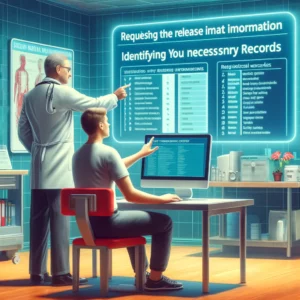What Does Requesting Release of Information Mean?
Requesting the release of information is a procedural act wherein an individual or legal representative seeks authorization to access specific data or documents that are otherwise confidential or private. This process is common in several areas such as healthcare, law, and insurance. For instance, in the medical field, this might involve accessing a patient’s health records, whereas in legal matters, it could relate to obtaining accident reports or insurance documentation.
This request for information is particularly significant in legal contexts, especially in personal injury cases. Attorneys often need to procure pertinent information to build a robust case for their client. The information sought typically includes medical records, accident scene reports, and insurance policy details. These documents are crucial as they help establish the severity of injuries, identify the parties at fault, and formulate the basis for claiming damages.
The formalities involved in requesting information require precision and legal knowledge. A detailed written request must be submitted, outlining the specific data needed and the reasons for its relevance to the ongoing case. This documentation is essential as it communicates the formal intent to access certain records, ensuring that the request complies with legal standards and respects the privacy and rights of all parties involved.
Upon receiving a request for information, the custodian of the records—the party holding the information—evaluates it based on several criteria. These include the legal validity of the request, its relevance to the case at hand, and any prevailing privacy laws or policies that protect the information. The response to this request can either be an approval to release the requested information or a denial, which might be based on factors like insufficient legal basis or privacy concerns.
In instances where the information holder denies the request or if the data is particularly sensitive, obtaining a court order may become necessary. This legal mandate compels the release of information and overrides standard privacy protections, provided there is sufficient justification in the interest of justice. Thus, the process of requesting and releasing information is a carefully balanced act, ensuring both the pursuit of legal rights and the protection of privacy.
Potential Challenges To Requesting Release of Medical Information
Provider Delays

Each medical provider operates with a set of unique internal procedures developed to manage the release of information. These procedures often involve multiple steps, including verifying the legitimacy of the request, ensuring that the requester has appropriate authorization, and meticulously reviewing the information to be disclosed to prevent unauthorized access to sensitive data. While these steps are crucial for protecting patient privacy and adhering to legal standards, they can be inherently time-consuming. This complexity contributes to the delays, as staff must navigate through these detailed protocols for each individual request.
The impact of these delays can be significant, affecting various stakeholders including patients, legal teams, and insurance companies. For patients awaiting decisions on insurance claims or medical treatments, delays can translate into postponed care or financial distress. Legal professionals might also face setbacks in building cases or meeting judicial deadlines without timely access to necessary documentation. Consequently, there is an ongoing need for efficiency improvements in how medical information requests are processed, balancing the need for thorough review and the urgency of the requests.
Incomplete Records
Receiving incomplete records is a common challenge in the management of personal injury cases, which can arise from various lapses within the record-keeping and retrieval processes. Missing documentation can result from clerical errors, where certain important documents or pieces of information are not filed correctly, or they may not be captured at all due to oversight during the documentation process. Additionally, mishandling of records, such as physical damage to paper files or data corruption in electronic systems, can lead to significant gaps in the information available. These omissions can complicate the task of assembling a complete and accurate case history.
The presence of incomplete records in a personal injury case can severely impede progress, as these records are essential for establishing the full scope of a client’s medical history and the extent of injuries sustained. Without a comprehensive view, it becomes difficult for attorneys to argue the case effectively or for medical professionals to provide appropriate ongoing care. In legal contexts, incomplete records can weaken a client’s position by leaving gaps that are open to interpretation, which opposing legal teams can exploit. This can potentially lead to underestimation of damages or claims being questioned, thereby affecting the outcome of the case.
To mitigate the risks associated with incomplete records, continuous efforts are needed to enhance record-keeping practices and improve the accuracy of medical documentation. This includes training for staff on the importance of thorough documentation and the use of advanced digital systems that reduce the likelihood of human error. Additionally, legal teams must diligently verify the completeness of records received and request further documentation proactively if discrepancies or omissions are detected. Ensuring completeness not only strengthens a case legally but also supports better medical outcomes by providing healthcare providers with the full context of a patient’s health status.
Refusal to Release Records
In some scenarios, a medical provider may refuse to release records, exercising their right to withhold information under specific and limited conditions. Such refusals are often grounded in the need to protect the patient’s well-being or to adhere to legal constraints. For instance, if there is a reasonable belief that the disclosure of certain medical details could potentially harm the patient—either psychologically or physically—the provider may opt to withhold those records. Additionally, legal restrictions might prevent the release of information, particularly if it pertains to ongoing legal disputes or investigations in which the provider is also an involved party. This ensures that the process does not interfere with legal proceedings or violate court orders that might be in place.
These refusals, while necessary in certain circumstances, must be carefully justified and documented to ensure they align with legal and ethical standards. Providers are required to balance the legal rights of the requesting parties with the confidentiality and safety of the patient. In cases where information is withheld, providers should communicate clearly the reasons for the refusal, offering alternatives if possible, such as providing a summary of the information instead of the full record. This approach helps maintain transparency in the patient-provider relationship and upholds the integrity of legal processes, ensuring that all actions are justifiable and in compliance with applicable laws and ethical guidelines.
Benefits of Efficient Release of Information
Strengthens the Case

Having immediate access to medical records not only helps in revealing the full extent of injuries but also assists in establishing causality and substantiating claims for damages. This is particularly important in personal injury law, where the strength of the evidence can directly influence the compensation awarded. Detailed and complete medical records serve as irrefutable proof of the injuries and are pivotal in convincing the court or opposing parties of the validity of the claims. Consequently, the prompt and efficient handling of medical information requests can significantly affect the outcome of a case, potentially leading to a more favorable settlement for the injured party.
Facilitates Communication with Insurers
Rapid access to medical information significantly enhances the efficiency of communication between personal injury attorneys and insurance companies. When attorneys can access complete and accurate medical records swiftly, they are better equipped to respond to insurer inquiries with precision. This timely exchange of information is critical, particularly during the early stages of claim processing, where insurers assess the validity and extent of claims. Having all necessary medical data readily available allows attorneys to submit thorough evidence of injuries, which streamlines the claim evaluation process and aids in establishing the need for compensation based on concrete medical findings.
Moreover, when attorneys have comprehensive medical records in their possession, they can negotiate settlements more effectively. Detailed documentation of injuries not only strengthens the case but also provides a solid foundation for discussing compensation. Insurers are more likely to engage in negotiations in good faith when presented with well-documented evidence, leading to quicker and more equitable settlements. This capability to promptly and effectively communicate with insurance companies not only expedites the claims process but also enhances the likelihood of achieving satisfactory resolutions for clients, reflecting positively on the diligence and capability of the legal representation involved.
Assists in Case Strategy
The availability of medical records is a cornerstone in formulating a robust case strategy for personal injury attorneys. Access to these records provides a detailed understanding of the medical aspects of a case, crucial for crafting a compelling narrative and anticipating possible legal challenges. These documents offer critical insights into the severity of injuries, the prognosis, and the necessary treatments, all of which are instrumental in calculating appropriate compensations and crafting arguments. By analyzing this data, attorneys can map out a strategic approach that addresses both the immediate needs of the client and the long-term implications of their injuries, ensuring that all aspects of the client’s well-being are considered in the legal process.
Moreover, having comprehensive medical records allows attorneys to anticipate potential defenses from opposing parties. Knowledge of the full medical history of the client enables the attorney to address and counteract any arguments that might suggest pre-existing conditions or alternative causes for the injuries claimed. This preparation is vital for rebutting attempts to undermine the client’s claims, enhancing the attorney’s ability to defend the client’s right to compensation effectively. Additionally, understanding the medical details helps in foreseeing the types of expert testimonies that might be required, allowing the attorney to procure the appropriate medical experts to corroborate the case.
Lastly, the strategic advantages gained from having access to complete medical records extend to the negotiation table. With a clear and accurate depiction of the injuries and their impacts, attorneys can enter negotiations with a strong position, backed by factual evidence that supports the client’s demands. This readiness not only empowers the attorney during settlement discussions but also bolsters their confidence in rejecting inadequate offers and pursuing the case in court if necessary. In essence, thorough preparation based on comprehensive medical documentation significantly influences the dynamics of case strategy, potentially leading to more favorable outcomes for the client.
Supports Client Communication
A quick and efficient release of medical information significantly enhances the communication between attorneys and their clients, playing a vital role in the management of personal injury cases. When attorneys have prompt access to up-to-date medical records, they are better equipped to keep clients informed about the progress of their cases. This transparency is crucial for building trust and rapport, as clients appreciate regular updates that reflect the current status and future steps in their legal journey. Additionally, having access to comprehensive medical data allows attorneys to discuss the client’s medical conditions more effectively within the context of the case. This kind of open communication helps clients understand how their medical facts are being represented legally, what to expect during legal proceedings, and how their case is developing overall.
Efficient information flow supports setting realistic expectations about case outcomes, which is essential for client satisfaction. When attorneys can provide detailed explanations based on concrete medical evidence, clients are more likely to have a realistic perspective on the potential outcomes of their cases. This understanding helps manage their expectations, reducing the potential for dissatisfaction with the legal process or outcomes. Furthermore, well-informed clients can make more educated decisions about their options, such as whether to settle or proceed to trial. Ultimately, efficient communication supported by timely access to medical information not only fosters a smoother attorney-client relationship but also enhances the overall effectiveness and satisfaction with the legal services provided.
Encourages Timely Filing
The faster release of medical records is instrumental in helping personal injury attorneys meet critical deadlines, particularly those governed by the statute of limitations. In many jurisdictions, personal injury claims are subject to specific time limits within which a lawsuit must be filed. Delayed access to medical records can jeopardize the ability to file within these legally mandated periods, potentially barring the injured party from seeking compensation altogether. Prompt receipt of these records enables attorneys to assemble the necessary documentation and evidence more quickly, ensuring that all legal actions are initiated within the required timeframe. This not only secures the right to pursue legal recourse but also demonstrates an attorney’s diligence and commitment to their client’s case.
Timely filing of cases supported by comprehensive and early-gathered medical evidence can prevent various administrative and procedural delays that might otherwise complicate or elongate the legal process. When cases are filed promptly, it allows for smoother progress through the legal system, avoiding the pitfalls of last-minute submissions such as rushed preparations or incomplete evidence submission. This efficiency not only helps in maintaining the momentum of the case but also in reinforcing its credibility and seriousness in the eyes of the court and opposing parties. Ultimately, the quick availability of medical records ensures that personal injury cases are managed effectively, enhancing the likelihood of a favorable outcome for the client.
Steps to Requesting Release of Information
Identifying Necessary Records

In order to obtain these necessary records, it is essential to identify potential sources where these documents can be found. Common sources include hospitals where treatment was administered, clinics, primary care physicians, specialists, and therapists who were involved in the treatment of the injuries. Each of these sources might hold key pieces of the medical history puzzle that are crucial for the case. Additionally, for injuries requiring long-term rehabilitation, records from physiotherapists or chiropractors may also be vital. Legal teams must ensure that requests for records are sent to all relevant sources to compile a full and uninterrupted medical history. This diligence not only aids in presenting a well-documented case but also in navigating through the complexities of medical evidence retrieval efficiently.
Obtaining Client Authorization
Obtaining written consent from the client is a crucial step in the process of releasing medical records, ensuring that all actions adhere to legal and ethical standards. This consent is typically formalized through an authorization form, which the client must sign before any sensitive medical information can be disclosed. This form not only serves as a legal document but also as a clear indication of the client’s willingness to have their medical records used in the context of their case. The importance of securing this authorization lies in upholding the principles of confidentiality and privacy, ensuring that the client’s information is protected and only shared with parties relevant to the legal proceedings.
The authorization form should be comprehensive, detailing the patient’s information, the specific records required, and the purpose of the disclosure. It should clearly state which medical providers can release information, what types of records are to be released (such as medical history, treatment details, billing information), and to whom these records are to be disclosed. This precision not only helps in avoiding any unnecessary release of information but also assists medical providers in understanding the scope of the request, thus facilitating a more focused and efficient retrieval process. By delineating these details, the form helps maintain the integrity of the information exchange and ensures that all parties are informed and compliant with the stipulations set forth by the client’s consent.
Submitting the Request
Submitting requests for medical records can be done through various means, such as mail, fax, or online portals, depending on the preferences and capabilities of each healthcare provider. It is crucial for legal teams to familiarize themselves with the specific submission methods preferred by different medical institutions to ensure that the requests are processed efficiently and without unnecessary delay. For instance, some larger medical centers may have dedicated online portals for handling such requests, which can speed up the process and provide immediate confirmation of receipt. Conversely, smaller clinics might still rely on traditional methods like fax or mail, which necessitate different handling and follow-up procedures. Understanding and adapting to each provider’s system is essential for the smooth and timely retrieval of needed records.
To facilitate efficient processing, it is important to adhere strictly to the preferred submission methods of each healthcare provider. This includes using the correct forms, adhering to the requested formats, and including all required information, such as patient identifiers and specific details about the records being requested. Ensuring that each request is complete and conforms to the provider’s requirements can significantly reduce the chances of delays caused by requests being returned for corrections or additional information. Moreover, maintaining a systematic approach to how requests are prepared and sent not only streamlines the process but also helps in building a professional relationship with the record custodians, potentially improving response times for future inquiries.
Addressing Fees
When requesting medical records, it is important to be aware that some healthcare providers may charge fees for the retrieval and copying of records. These fees can vary significantly depending on the provider’s policies, the volume of records requested, and the format in which they are delivered (such as paper copies or digital formats). Understanding these potential costs upfront is crucial for managing the financial aspects of a case effectively. Legal teams should inquire about any associated fees during the initial stages of record retrieval to ensure that all costs are accounted for in their budget planning. Additionally, this awareness allows attorneys to advise their clients accurately about the possible expenses involved in obtaining the necessary medical documentation.
To manage and potentially reduce these costs, attorneys have a couple of options. One strategy is to negotiate with healthcare providers on the fees, especially if the volume of records is substantial or if the client has limited financial resources. Some providers may be willing to lower costs for bulk requests or for clients demonstrating financial hardship. Another approach is arranging for client reimbursement, where clients agree to cover the upfront costs of obtaining their records, which can be reimbursed later as part of the settlement or judgement. This method can alleviate immediate financial pressures on the law firm while ensuring that the necessary records are obtained promptly to advance the case.
Following Up
Keeping track of medical record requests is essential for ensuring that they are processed in a timely manner. It is advisable for legal teams to implement a systematic approach to monitor the status of each request. This includes maintaining detailed records of when requests were sent, which provider they were sent to, and the expected timeframe for a response. If there appears to be a delay or if the initial deadline for response passes without receipt of the records, following up with the provider becomes crucial. Proactive follow-up can help identify any issues in the processing of the request, such as missing information or administrative oversights, which can then be addressed promptly to avoid further delays.
Using phone calls or emails are effective methods for following up on requests. Phone calls can provide immediate feedback and the opportunity to resolve issues in real time, making them a valuable tool for urgent or delayed requests. On the other hand, emails serve as a good record of communication and can be useful when a detailed history of interactions needs to be maintained. Both methods should be used judiciously based on the urgency of the situation and the typical response mode of the provider. It’s important for attorneys to establish a rapport with record custodians, as cooperative relationships can facilitate smoother communications and potentially expedite the handling of requests.
The process of requesting the release of information, while essential in personal injury cases, can be fraught with challenges and complexities. From navigating provider delays and managing incomplete records to handling refusals from healthcare providers, each step requires careful strategy and adherence to legal requirements. However, the benefits of efficiently managing this process are substantial. Quick access to medical records not only strengthens a case but also enhances communication with insurers, supports strategic case planning, improves client relations, and ensures timely filing. The steps to effectively request and manage the release of information—identifying necessary records, obtaining client authorization, submitting requests in preferred formats, addressing associated fees, and diligently following up—form the backbone of a successful legal approach. Mastering these steps can significantly impact the outcome of a case, emphasizing the critical role of meticulous record management in the realm of legal proceedings.







